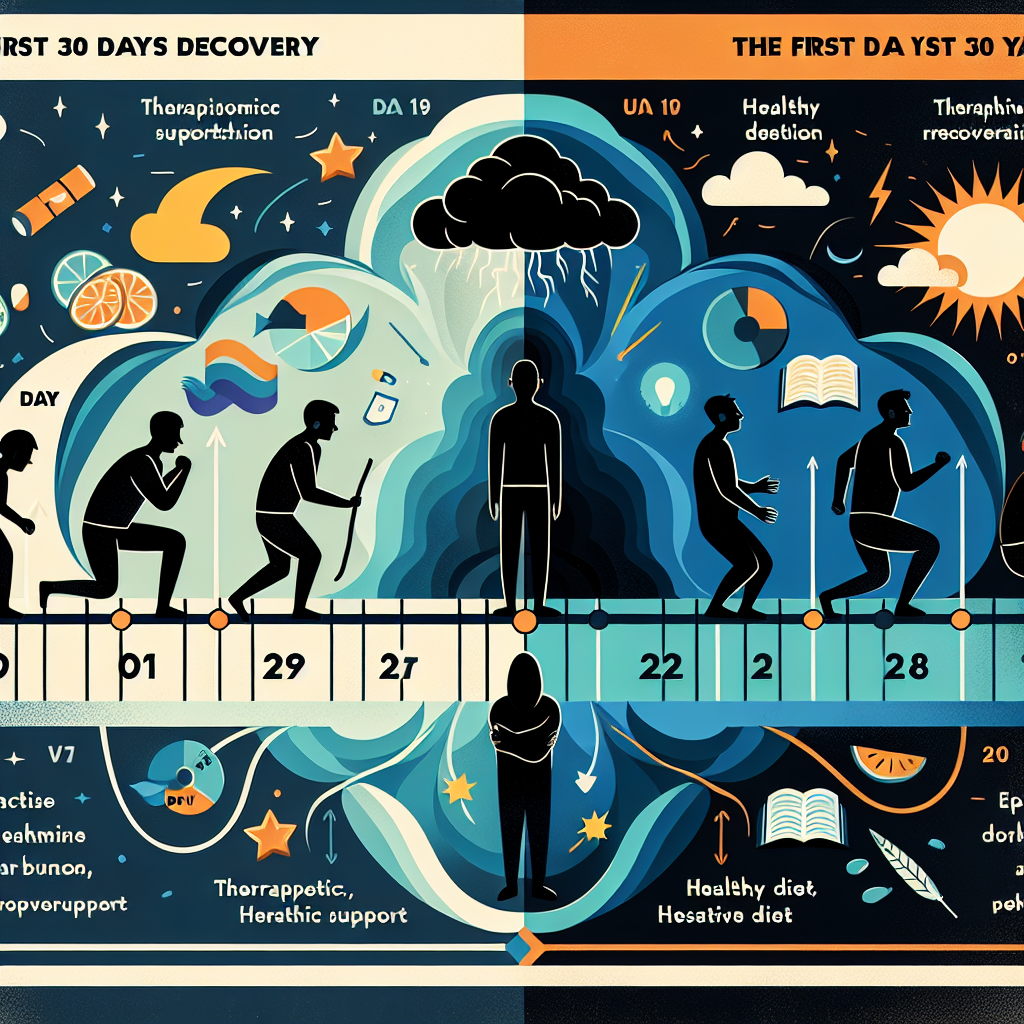-
Table of Contents

“Navigating the Path to Sobriety: Your First 30 Days of Transformation and Hope”
Introduction
The first 30 days of addiction recovery are a critical period marked by significant physical, emotional, and psychological changes. During this initial phase, individuals can expect to experience withdrawal symptoms as their bodies begin to detoxify from substances. These symptoms can range from mild to severe, depending on the substance and the duration of use. Emotionally, individuals may face intense feelings of anxiety, depression, and mood swings as they adjust to life without their addiction. Psychologically, the first month often involves confronting the underlying issues that contributed to the addiction, which can be both challenging and enlightening. Support systems, including therapy, support groups, and possibly medication, play a crucial role in navigating this tumultuous period. Establishing a routine, setting realistic goals, and building a network of support are essential steps in laying the foundation for long-term recovery.
Navigating Emotional Highs and Lows in the First 30 Days of Addiction Recovery
The first 30 days of addiction recovery are often described as a rollercoaster of emotions, a period marked by both hope and challenge. As you embark on this transformative journey, it is essential to understand that experiencing emotional highs and lows is a natural part of the process. This awareness can help you navigate these turbulent waters with greater resilience and optimism.
Initially, the decision to seek recovery is often accompanied by a sense of relief and newfound hope. The realization that you are taking control of your life and making positive changes can be incredibly empowering. This initial high can provide the motivation needed to commit to the recovery process. However, it is important to recognize that this feeling may be fleeting, and the journey ahead will require perseverance and support.
As the days progress, you may encounter a range of emotions, from anxiety and fear to sadness and anger. These feelings are often intensified by the physical and psychological withdrawal symptoms that accompany the cessation of substance use. It is crucial to remember that these symptoms are temporary and will gradually subside as your body and mind begin to heal. During this time, practicing self-compassion and patience is vital. Allow yourself to feel these emotions without judgment, and remind yourself that they are a normal part of the recovery process.
One of the most significant challenges in the first 30 days of recovery is managing cravings and triggers. These can be powerful and overwhelming, often leading to feelings of frustration and self-doubt. Developing healthy coping mechanisms, such as mindfulness techniques, exercise, and engaging in hobbies, can help you navigate these moments. Additionally, seeking support from a therapist, support group, or trusted loved ones can provide invaluable guidance and encouragement.
As you continue to progress through the first month of recovery, you may begin to experience moments of clarity and self-discovery. These emotional highs can be incredibly rewarding, as they offer glimpses of the person you are becoming without the influence of substances. Embrace these moments and use them as motivation to continue your journey. Reflecting on your progress and celebrating small victories can help reinforce your commitment to recovery.
However, it is also common to experience setbacks and moments of doubt during this period. It is essential to approach these challenges with a growth mindset, viewing them as opportunities for learning and growth rather than failures. Remember that recovery is not a linear process, and setbacks do not define your journey. Instead, they provide valuable insights into areas that may require additional attention and support.
Throughout the first 30 days of recovery, building a strong support network is crucial. Surrounding yourself with individuals who understand and support your journey can provide a sense of belonging and encouragement. Whether through support groups, therapy, or trusted friends and family, having a network of people who can offer empathy and guidance can make a significant difference in navigating the emotional highs and lows of recovery.
In conclusion, the first 30 days of addiction recovery are a time of profound emotional fluctuation. By acknowledging and accepting these highs and lows, practicing self-compassion, and seeking support, you can navigate this challenging period with resilience and hope. Remember that each day is a step forward on your journey to a healthier, more fulfilling life. Embrace the process, celebrate your progress, and trust in your ability to overcome the obstacles that lie ahead.
Building a Support System: Key Steps in the Initial 30 Days of Addiction Recovery
Building a support system is one of the most crucial steps in the initial 30 days of addiction recovery. During this transformative period, individuals often face a whirlwind of emotions and challenges, making it essential to have a reliable network of support. The journey to sobriety is not one that should be undertaken alone, and understanding how to cultivate a strong support system can significantly enhance the chances of long-term recovery.
In the first few days of recovery, it is common to feel overwhelmed and uncertain. This is where the importance of a support system becomes evident. Family and friends can play a pivotal role in providing emotional stability and encouragement. However, it is equally important to recognize that not all relationships may be conducive to recovery. Identifying and surrounding oneself with positive influences is a critical step. This might mean distancing from individuals who may trigger a relapse or who do not support the recovery process.
Transitioning into a structured environment, such as a rehabilitation center or a sober living home, can provide an immediate support network. These facilities often offer a community of individuals who are on similar journeys, fostering a sense of camaraderie and mutual understanding. Additionally, professional counselors and therapists are available to guide individuals through the emotional and psychological aspects of recovery. Engaging in regular therapy sessions can help address underlying issues that may have contributed to addiction, providing a solid foundation for lasting change.
As the days progress, participating in support groups such as Alcoholics Anonymous (AA) or Narcotics Anonymous (NA) can be incredibly beneficial. These groups offer a safe space to share experiences, gain insights, and receive encouragement from others who have faced similar struggles. The sense of belonging and acceptance found in these groups can be a powerful motivator, reinforcing the commitment to sobriety.
Moreover, building a support system extends beyond human connections. Establishing healthy routines and habits is equally important. Engaging in physical activities, such as yoga or jogging, can help alleviate stress and improve overall well-being. Nutrition also plays a vital role in recovery; a balanced diet can aid in restoring physical health and energy levels. Incorporating mindfulness practices, such as meditation or journaling, can provide mental clarity and emotional balance, further supporting the recovery process.
It is also essential to set realistic goals and celebrate small victories along the way. Recovery is a gradual process, and acknowledging progress, no matter how minor, can boost morale and motivation. Sharing these achievements with a support network can amplify the sense of accomplishment and reinforce positive behaviors.
In addition to personal efforts, leveraging community resources can enhance the support system. Many communities offer programs and services specifically designed to assist individuals in recovery. These may include job training, educational opportunities, and housing assistance, all of which can contribute to a stable and supportive environment.
As the first 30 days of recovery come to a close, it is important to reflect on the progress made and the support system that has been built. This period is just the beginning of a lifelong journey, and maintaining and nurturing these connections will be crucial for sustained sobriety. By prioritizing a strong support system, individuals can navigate the challenges of recovery with resilience and hope, paving the way for a healthier, more fulfilling life.
Q&A
1. **Question:** What are some common physical symptoms experienced in the first 30 days of addiction recovery?
**Answer:** Common physical symptoms in the first 30 days of addiction recovery can include fatigue, insomnia, nausea, headaches, and changes in appetite.
2. **Question:** What emotional challenges might individuals face during the initial 30 days of addiction recovery?
**Answer:** Emotional challenges in the first 30 days of addiction recovery can include anxiety, depression, mood swings, irritability, and feelings of guilt or shame.
Conclusion
In the first 30 days of addiction recovery, individuals can expect a challenging yet crucial period marked by physical and emotional withdrawal symptoms, the establishment of new routines, and the beginning of therapy or counseling. This initial phase often involves detoxification, which can be physically taxing, and the development of coping strategies to manage cravings and triggers. Emotional support from family, friends, or support groups is vital, as is professional guidance to address underlying issues and build a foundation for long-term recovery. Overall, the first month is a critical time for setting the stage for sustained sobriety and personal growth.



